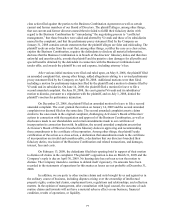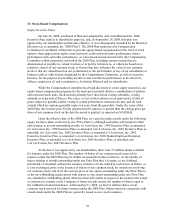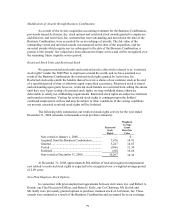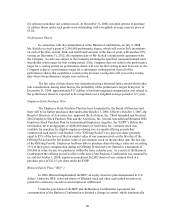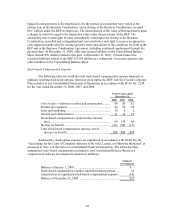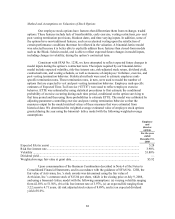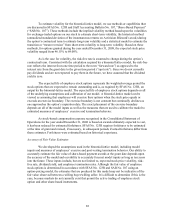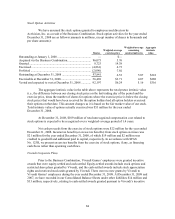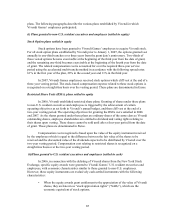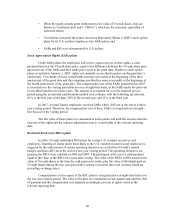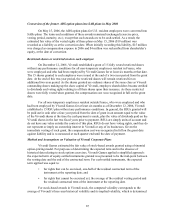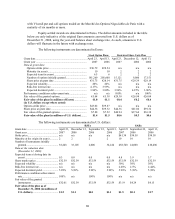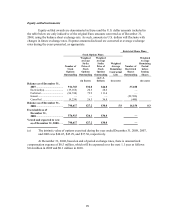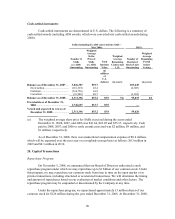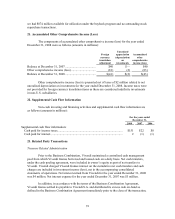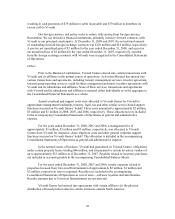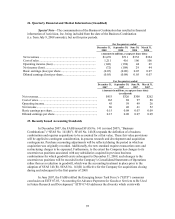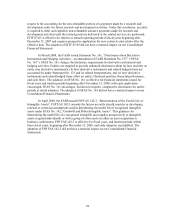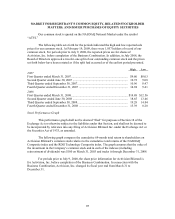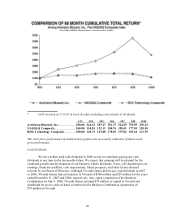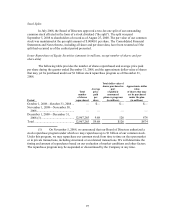Activision 2008 Annual Report Download - page 101
Download and view the complete annual report
Please find page 101 of the 2008 Activision annual report below. You can navigate through the pages in the report by either clicking on the pages listed below, or by using the keyword search tool below to find specific information within the annual report. 87
Conversion of the former ADS option plans into SAR plans in May 2006
On May 15, 2006, the ADS option plans for U.S. resident employees were converted into
SARs plans. The terms and conditions of these awards remained unchanged (exercise price,
vesting period, maturity, etc.), except that such awards are to be cash-settled. As a result, the
estimated fair value of the vested rights of these plans on May 15, 2006 ($19 million) was
recorded as a liability as at the conversion date. When initially recording this liability, $15 million
was charged as compensation expense in 2006 and $4 million was reclassified from shareholder’s
equity, at the date of conversion.
Restricted shares or restricted stock to each employee
On December 12, 2006, Vivendi established a grant of 15 fully vested restricted shares
without any performance conditions for all non-temporary employees resident in France, who
were employed and who had been employed by Vivendi Games for at least six months at that date.
The 15 shares granted to each employee were issued at the end of a two-year period from the grant
date. At the end of this two-year period, the restricted shares will remain restricted for an
additional two-year period. As the shares granted are ordinary shares of the same class as Vivendi
outstanding shares making up the share capital of Vivendi, employee shareholders became entitled
to dividends and voting rights relating to all their shares upon their issuance. As these restricted
shares were fully vested when granted, the compensation cost was recognized in full on the grant
date.
For all non-temporary employees resident outside France, who were employed and who
had been employed by Vivendi Games for at least six months as of December 12, 2006, Vivendi
established a 15 RSU plan without any performance conditions. In general, the RSUs granted will
be paid out in cash after a four-year period from the date of grant in an amount equal to the value
of the Vivendi shares at the time the cash payment is made, plus the value of dividends paid on the
Vivendi shares in the last two fiscal years prior to payment. RSUs are simply units of account and
do not have any value outside the context of this plan. RSUs do not have voting rights, and they do
not represent or imply an ownership interest in Vivendi or any of its businesses. Given the
immediate vesting of such grant, the compensation cost was recognized in full on the grant date
against liability and is re-measured at each quarter end until the date of payment.
Method and Assumptions on Valuation of Vivendi Corporate Plans
Vivendi Games estimated the fair value of stock-based awards granted using a binomial
option-pricing model. For purposes of determining the expected term and in the absence of
historical data relating to stock options exercises, Vivendi Games applied a simplified approach:
the expected term of equity-settled instruments granted was presumed to be the mid-point between
the vesting date and the end of the contractual term. For cash-settled instruments, the expected
term applied was equal to:
• for rights that can be exercised, one-half of the residual contractual term of the
instrument at the reporting date; and
• for rights that cannot be exercised yet, the average of the residual vesting period and
the residual contractual term of the instrument at the reporting date.
For stock-based awards in Vivendi stock, the computed volatility corresponds to the
average of Vivendi’s three-year historical volatility and its implied volatility, which is determined


